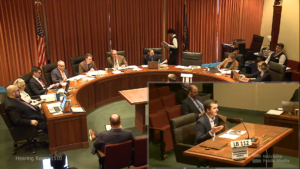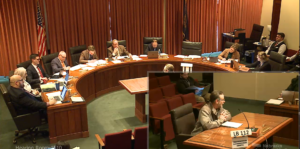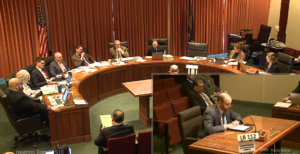
Nebraska Auto Body Association behind bill to curb improperly repaired structural damage
By onCollision Repair | Legal
A bill introduced in the Nebraska Legislature aims to mitigate unsafe rebuilt vehicles making it back onto roads.
LB 112 would create a new category of “structurally totaled” salvage titles for vehicles with major structural damage exceeding 75% of the vehicle’s value. “Structurally totaled” is defined in the bill as “a vehicle totaled due to a kink or crease in a frame rail, a unibody, or a structural component, including an engine cradle or a rear differential.”
The bill would require repair shops and insurance companies to agree that vehicles are structurally totaled to receive that determination for a title, according to bill sponsor Sen. Dan Quick (D-District 35). The bill states a “salvage” designation applies to vehicles that are deemed structurally totaled “by a facility that performs consumer care and by an insurance company that insured the vehicle at the time it sustained the damage that caused it to be deemed a structurally totaled vehicle.”
Dave Yard, Nebraska Auto Body Association (NABA) chair and owner of The Collision Center, said the bill will be amended to specify that vehicles under the new classification would only be safe to part out. Currently, structurally damaged vehicles are auctioned and rebuilt, not necessarily properly, then resold.
“I see them coming in the shop with drywall screws sticking up,” he said. “They’re not even welded back together — carpet thrown over the top of it and that vehicle’s going to roll over. It’s going to crush prematurely and you’re going to have all these porcupines of drywall screws sticking up there, stabbing the guy’s daughter that just bought the car or their friend that’s driving.
“I’ve seen modules cut apart, soldered, taped over the access hole, and reinstalled. It is harder to recognize when air bags, seatbelts, and other equipment have been replaced. If so, they have been replaced with parts from another vehicle. Most safety equipment is required to be replaced after a collision, even if it appears undamaged.”
Quick said during a Feb. 10 hearing on his bill that, if it becomes law, majorly totaled vehicles wouldn’t necessarily be taken off the road.
“But they would be and should be labeled a structural salvage title,” he said. “The practical problem is Nebraskans are buying vehicles that are structurally damaged and they have no idea. Body shops across Nebraska are increasingly pulling back panels, bumpers, and hoods and finding consumers are driving vehicles that are unsafe. The proponents of this bill do not have a financial incentive. The reason for this legislation is to ensure there’s awareness.”
Committee member Sen. Tom Brandt asked why insurance companies don’t dispose of structurally damaged vehicles in a way that they can’t be rebuilt. Yard replied that under current state law, salvaged vehicles can be fixed properly but that’s not always the case.
“That car can be rebuilt even though it’s structurally damaged,” Yard said. “If that means cutting the entire frame rail, if it could be a quarter section of the car, if the manufacturer says you can do it that way, we’ll do that. And if it’s still within the value of the car, we can do a good job, repair that car put it back on the road, and be confident that the person is going to be safe should they be in another accident.”
However, he contends that the state needs a title classification that’s parts only so vehicles can still be sold for parts rather than rebuilt by someone who cuts corners to make a profit.
Ryan Clark, Eustis Body Shop vice president and NABA vice chair, said the point of the bill is to signify the difference between structurally damaged vehicles and those that are totaled because repairs would cost more than 75% of the vehicle value. He shared examples with the committee of vehicles for sale by Copart that have rebuilt salvage titles but are advertised as having clean titles.
“We’re in the business of repairing damaged vehicles,” Clark said. “This bill will not increase our revenue or bottom line. It’s just the right thing to do for our consumers. We in the industry believe that it’s necessary to protect consumers so they can make informed decisions when they’re purchasing vehicles for themselves and their loved ones. Vehicles are coming to the state to be sold at auction for higher value than other states.”
Clark noted that Florida recently passed similar legislation that requires parts-only vehicles to have titles of destruction.
“However, there is a process for you to rebuild that car and put a new frame on it or whatever it may be, and then it’ll be branded a rebuilt title,” he said.
The Nebraska Insurance Federation and American Property Casualty Insurance Association (APCIA) spoke in opposition to the bill.
The federation’s argument from lobbyist and Executive Director Robert Bell is that the new category would cause a number of issues for consumers and insurers including increased costs.
“It places the decision of whether or not a vehicle is structurally destroyed in the hands of both an auto body shop and the insurer,” he said.
“Currently, those decisions are made by insurance companies, not by the auto body community. Additionally, the definition of structurally total vehicles is puzzling… Perhaps this is intended for non-late model vehicles, which will result in less older vehicles on the road as salvage title vehicles are typically owned by insurance companies and are more difficult to register.”
Brandt asked how the federation proposes to address the problem.
“We certainly don’t want to insure people that are driving vehicles with drywall screwed frames either; however, we’re the ones with the financial interest,” Bell said. “At the end of the day, if that vehicle is in an accident and it falls apart, we’re going to be responsible for all the variety of things that are going to come our way related to injury, death, and repair of the vehicles involved and so certainly we have no interest in insuring shoddy vehicles.
I’ve got teenagers. My teenager drives a Honda Civic, let’s say it has a bend in the frame and he’s in an accident, which happens more than I care to mention in a fender bender or something like that, and that can be safely repaired for let’s say, $1,000. That is going to be well more than 75% of the value of that particular vehicle. I should have that option to have that repaired. Under Nebraska’s current salvage law, because that vehicle is over seven years of age, as it’s done safely he could continue to drive that vehicle.”
Justin Brady, lobbyist for APCIA, said the association represents about 50% of all private passenger automobile insurance purchases in the state and “have a vested interest to make sure cars are safe.”
He said, “I think the real question is… should the state automatically say, because there’s frame damage, it’s automatically salvaged and therefore go through the whole process of being salvaged title or automatically just being parted out? From the insurance company standpoint, they don’t think that distinct line should be drawn because it should be valued at each car.”
Under the bill, “you have to take that car off this road forever or part it out,” which Brady believes “doesn’t seem to jive with what manufacturers are making from that,” in reference to his stance that OEMs allow unibody frame repairs.
“That’s why I think it should still stay as a decision of insurance companies as they’re evaluating these vehicles,” he said.
Brady added that to tell if vehicles are repaired correctly, a post-repair inspection would likely have to be done which is “another cost to everybody who just was, unfortunately, in an accident,” seemingly brushing off the importance of post-repair inspections.
The Collision Industry Conference Industry Relations Committee reviewed a sample of post-collision inspections and shared the results last year. The results showed that most consumers sought an inspection after noticing a poor paint job.
Following the post-repair inspection in 26 cases studied, 90% were totaled with 50% of the vehicles having significant frame damage.
Discussions about substandard repairs ramped up following a Texas lawsuit against John Eagle Collision Center for an improper repair in 2017.
A jury found the shop liable for injuries Marcia and Matthew Seebachan sustained from being trapped in a burning vehicle following a crash.
Experts for the plaintiffs said in court documents that the severity of the crash and the couple’s injuries were the result of the body shop adhesive-bonding the Fit’s roof during a $8,500 hail repair in 2012 for the prior owner, a State Farm policyholder. The experts said the repair didn’t follow OEM procedures.
An “empty chair” has been placed on the stage of CIC meetings for more than five years to remember the consumer and the human element of repairs. The Seebachans’ case is often referred to when mentioning the chair, including at CIC’s January meeting.
A similar bill to LB 112 was carried over into Nebraska’s 2024 legislative session from the previous year but it was “indefinitely postponed.”
Images
Featured image: Ryan Clark, Eustis Body Shop vice president and NABA vice chair, speaks during a Feb. 10 Nebraska Transportation and Telecommunications Committee hearing.
Dave Yard, Nebraska Auto Body Association (NABA) chair and owner of The Collision Center speaks during a Feb. 10 Nebraska Transportation and Telecommunications Committee hearing.
Nebraska Insurance Federation lobbyist Executive and Director Robert Bell speaks during a Feb. 10 Nebraska Transportation and Telecommunications Committee hearing.


